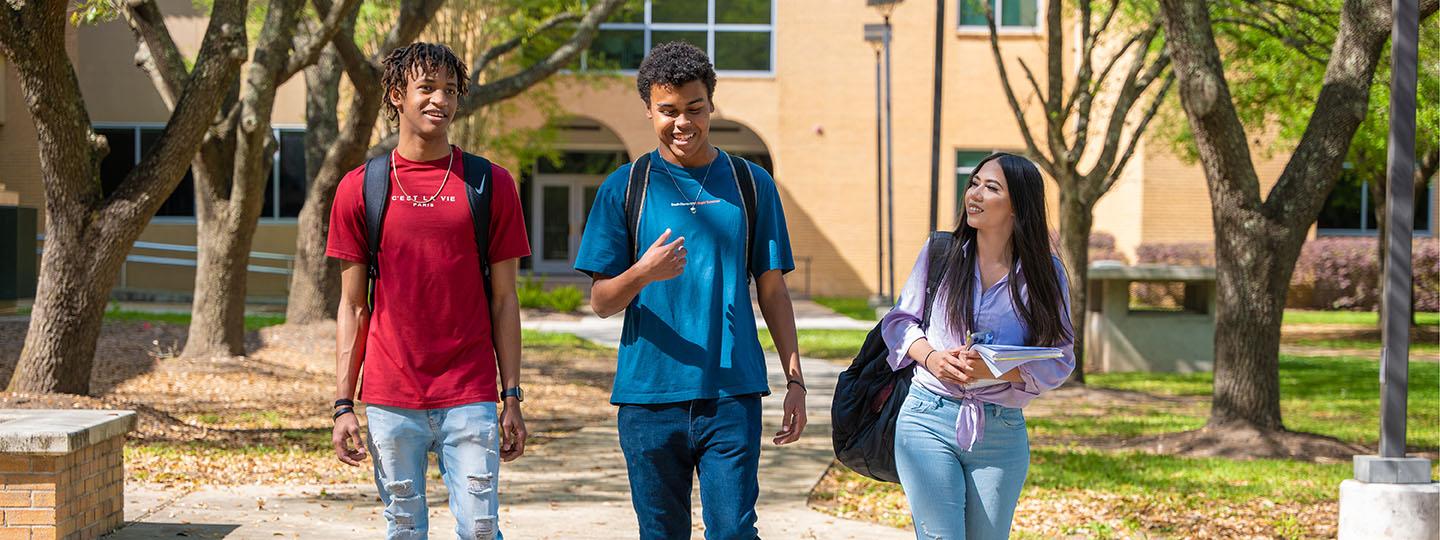Paving Pathways to Student Success

Houston GPS unites 13 colleges, universities to reduce student debt, increase graduation rates
PASADENA, Texas — There are many advantages for students starting their academic journeys at community colleges, then transferring to universities to complete their bachelor’s degrees. Cost, flexible schedules, smaller class sizes and adjusting to new learning environments are just some of the benefits of starting at a two-year institution before attending a university.
While there are myriad reasons to select community colleges before enrolling at a university, two-year institutions are often a natural fit for many students as they offer accessible approachable learning environments.
Still, the road to a bachelor’s degree can be daunting. Students can be denied credit when transferring courses from one institution to another, or they may take too many classes. In either situation, the result is lost time and excess debt. Worst-case scenario — a student may not realize their dream of earning a degree.
Thanks to a consortium of 13 Houston-area colleges and universities, students throughout Texas’ southeast region have opportunities to seamlessly transition from their community college of choice to an accredited public university. In the process, they stand to graduate on time, without excess credit hours and with less debt.
Since 2015, Houston Guided Pathways to Success (Houston GPS) has united Houston-area colleges and universities to help more Texans achieve their academic goals. Institutions included in Houston GPS include the University of Houston, University of Houston-Downtown, University of Houston-Clear Lake, University Houston-Victoria, Texas Southern University, Prairie View A&M University, Alvin Community College, College of the Mainland, Galveston College, Houston Community College, Lone Star College, San Jacinto College, and Wharton County Junior College.
Working together, these institutions help students stay on track within their respective degree programs, so they can ultimately complete their bachelor’s degrees.
“The goal of Houston GPS is to further ensure students accomplish their goal of graduating from a four-year university with degrees in hand,” said Loren Blanchard, president of the University of Houston-Downtown and chair of the Houston GPS Governing Council. “We achieve this by having our region’s leading institutions of higher education collaborate on strategies aimed at supporting student success.”
Through Houston GPS, colleges and universities pave easy-to-navigate pathways for students. Houston GPS strategies include:
- Degree mapping – Providing students with degree maps that outline their respective majors and list the transferable classes to take each semester at a community college, as well as the university courses needed to complete a bachelor’s degree.
- Structured schedules – Offering students consistent schedules relative to their respective degrees to better serve working students.
- Proactive advising – Universities and colleges work together to ensure advisors are able to help students navigate pathways between two and four-year institutions. Universities also will have advisors embedded at community college campuses to assist in the transfer process.
“Houston GPS is an important piece of the work we are doing regionally around transfer opportunities for community college students,” said Dr. Brenda Hellyer, San Jacinto College Chancellor. “We understand the importance of putting students on a path to transfer and earn their bachelor’s degrees and remain committed to working with our university partners and state officials to ensure transfer success.”
According to nonpartisan public policy think tank Texas 2036, nearly 200,000 Texas students graduate from community colleges each year with an average of 22 extra credit hours. Those extra hours would essentially comprise more than 71,000 additional associate degrees. Similarly, Texas university students are graduating with an average excess of 10 hours per student. With nearly 170,000 university graduates, those extra hours would account for 13,900 additional bachelor’s degrees.
“This has long been a problem and not just in Texas,” Blanchard said. “Working together, Houston GPS institutions hope to change this narrative and reverse the math, so we produce more degrees and less excess credit hours amongst our students.”
“Houston GPS is essentially a win-win for students within our region and the state of Texas,” added Diane Z. Chase, University of Houston System senior vice chancellor for academic affairs and UH senior vice president for academic affairs and provost. “Too often, students fall into the trap of taking too many classes or not taking the right classes. The result is lost time and lost dollars. Houston GPS shows students in the Houston-area that higher education institutions are committed to their success.”
Launched at the University of Houston, Houston GPS strives to increase graduation rates and support student success in the state’s largest metropolitan area. The consortium is led by a governing council that includes leaders from each participating community college and university. In addition to the council, Houston GPS hosts regular convenings in which higher education experts from across the nation share insights with college and university leaders to inspire new ideas and initiatives aimed at supporting student success. Houston GPS complements the efforts of all its institutions, which provide programs to help curb debt and accelerate students’ journeys toward graduation. This initiative is yet another way Houston-area higher education institutions inspire the promise of degrees among Texans.
Learn more about Houston GPS.
